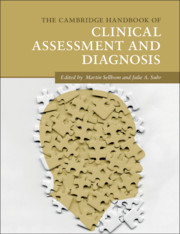Book contents
- The Cambridge Handbook of Clinical Assessment and Diagnosis
- The Cambridge Handbook of Clinical Assessment and Diagnosis
- Copyright page
- Contents
- Figures
- Tables
- Contributors
- Acknowledgments
- 1 Introduction to the Handbook of Clinical Assessment and Diagnosis
- Part I General Issues in Clinical Assessment and Diagnosis
- Part II Specific Clinical Assessment Methods
- 10 Clinical Interviewing
- 11 Multi-Informant Assessment of Psychopathology from Preschool through Old Age
- 12 Intellectual Assessment
- 13 Achievement Assessment
- 14 Using Vocational Assessment Tests
- 15 Neuropsychological Testing and Assessment
- 16 Minnesota Multiphasic Personality Inventory-2-Restructured Form (MMPI-2-RF)
- 17 Personality Assessment Inventory
- 18 The Millon Clinical Multiaxial Inventory-IV (MCMI-IV)
- 19 Self-Report Scales for Common Mental Disorders
- 20 Performance-Based Techniques
- Part III Assessment and Diagnosis of Specific Mental Disorders
- Part IV Clinical Assessment in Specific Settings
- Index
- References
16 - Minnesota Multiphasic Personality Inventory-2-Restructured Form (MMPI-2-RF)
from Part II - Specific Clinical Assessment Methods
Published online by Cambridge University Press: 06 December 2019
- The Cambridge Handbook of Clinical Assessment and Diagnosis
- The Cambridge Handbook of Clinical Assessment and Diagnosis
- Copyright page
- Contents
- Figures
- Tables
- Contributors
- Acknowledgments
- 1 Introduction to the Handbook of Clinical Assessment and Diagnosis
- Part I General Issues in Clinical Assessment and Diagnosis
- Part II Specific Clinical Assessment Methods
- 10 Clinical Interviewing
- 11 Multi-Informant Assessment of Psychopathology from Preschool through Old Age
- 12 Intellectual Assessment
- 13 Achievement Assessment
- 14 Using Vocational Assessment Tests
- 15 Neuropsychological Testing and Assessment
- 16 Minnesota Multiphasic Personality Inventory-2-Restructured Form (MMPI-2-RF)
- 17 Personality Assessment Inventory
- 18 The Millon Clinical Multiaxial Inventory-IV (MCMI-IV)
- 19 Self-Report Scales for Common Mental Disorders
- 20 Performance-Based Techniques
- Part III Assessment and Diagnosis of Specific Mental Disorders
- Part IV Clinical Assessment in Specific Settings
- Index
- References
Summary
The MMPI has been a mainstay of psychological assessment for nearly eight decades, a testament to the richness and clinical utility of the test. We begin this chapter by tracing the history and evolution of the MMPI instruments, including the rationale for and development of the MMPI-2-RF. First, we provide an overview of the test scales and the documents available to guide its administration, scoring, and interpretation. Next, we give an overview of the psychometric features of the MMPI-2-RF scales and a review of the literature on its use in a broad of applied settings. We then review the literature on multicultural considerations when using the MMPI-2-RF. A brief description of the adolescent version of the inventory, the MMPI-A-RF, is followed by a concluding section that illustrates MMPI-2-RF interpretation with a case study.
- Type
- Chapter
- Information
- The Cambridge Handbook of Clinical Assessment and Diagnosis , pp. 208 - 230Publisher: Cambridge University PressPrint publication year: 2019
References
- 1
- Cited by

